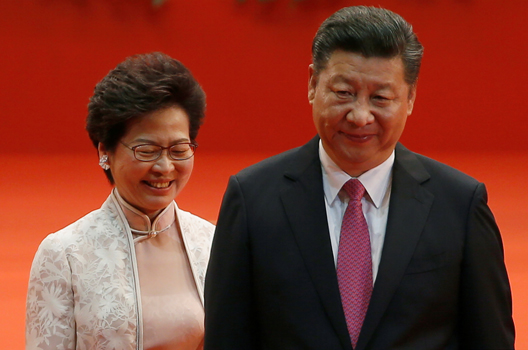
Beijing’s disregard for twenty-year-old agreement raises questions about Hong Kong’s future
Beijing’s disregard for an agreement that ensures Hong Kong’s basic freedoms raises doubts about the future of democracy in this Special Administrative Region of the People’s Republic of China.
On July 1, 1997, the United Kingdom (UK) handed Hong Kong back to China, ending 150 years of British colonial rule. On the eve of the twentieth anniversary of that occasion, Chinese Foreign Ministry spokesman Lu Kang said that the Sino-British Joint Declaration, which stipulated how Hong Kong would be governed after the handover, “no longer has any practical significance.”
Twenty years after the declaration entered into force, and thirty years before its expiration, the agreement is far from insignificant. It produced the “one country, two systems” arrangement between China and Hong Kong. This arrangement has ensured Hong Kong’s ability to govern under democratic principles, while remaining tied to the Chinese mainland.
The UK, whose former prime minister, Margaret Thatcher, was a signatory to the declaration, said in response to Lu’s statement that the declaration is still a “legally binding treaty” that must be upheld. British Foreign Secretary Boris Johnson said the UK remains as committed to the declaration today as it was twenty years ago.
China’s political, economic, and cultural influence in Hong Kong has become stronger as Beijing has tightened control over the island while disregarding warnings from the international community.
Beijing did, however, respect the terms of the Sino-British Joint Declaration in the first few years after Hong Kong’s handover. Hong Kong developed into one of Asia’s leading financial centers, enjoyed a limited franchise vote which ensured at least part of the legislature would be democratically elected, and acted as an autonomous capitalist society. However, progress toward greater democracy has slowed dramatically, especially over the past three years, highlighting the change in Chinese acceptance of the “one country, two systems” principle.
China tightened control over Hong Kong in 2014 with what is known as 31 August Decision. This decision, made jointly by the Standing Committee of the National People’s Congress (NPCSC) and China’s national legislative body, states that candidates for Hong Kong’s chief executive position must first receive votes from a special nominating committee before being presented to civilian voters. In other words, Beijing would pre-screen the candidates.
Pro-democracy advocates said the decision violated their right to free, democratic elections. The resulting protests became known internationally as the Umbrella Revolution.
Three years later, Beijing’s influence over Hong Kong has become even more forceful. This was evident during recent celebrations on July 1, marking the twentieth anniversary of the handover. Chinese President Xi Jinping delivered a speech in which he warned against “challenging the power of the central government.” His message was strengthened by the military spectacle put on by Beijing. With 3,000 Chinese troops taking part in a celebratory parade, it was the largest show of force by Beijing in Hong Kong since the handover.
The British government, and other members of the international community, have expressed concern over the situation in Hong Kong. Former British Prime Minister David Cameron argued that Hong Kong’s rights, established in the Sino-British Joint Declaration, should be protected. Christopher Patten, who served as governor of Hong Kong at the time of the handover, voiced his support for the Umbrella Revolution and spoke out against the “Iran-like” democracy China has chosen to implement in Hong Kong. China’s Foreign Ministry responded to the criticism noting that the “times have changed” and that no one has the right to interfere in China’s internal affairs.
In light of ongoing negotiations for the UK to leave the European Union (EU), getting China to uphold the terms of the joint declaration is not a political priority for London. That does not mean that the UK, as well as the United States and the EU, should remain silent. The joint declaration has no enforcement mechanism. It is, therefore, the responsibility of the international community to put pressure on China to adhere to the agreed terms.
This, however, will be complicated. The West, especially the United States, has become dependent on Chinese financing, has racked up huge trade deficits with China, and, to a certain extent, relies on China for security. Economically, politically, and strategically, it has long been in the best interests of the United States, the UK, and the EU to work with China.
In an ideal world, Western powers would stand up for democracy in Hong Kong. However, according to Robert Manning, a senior fellow at the Atlantic Council’s Brent Scowcroft Center on International Security, the West is unlikely to press China too hard on this matter as it is unwilling to link its complex relationship with China to Beijing’s policies in Hong Kong. As a consequence, Beijing will further tighten control over Hong Kong and encroach on the rights provided by the “one country, two systems” arrangement; Hong Kong will be pulled closer to the mainland.
It is clear that China will abide by international law only when and where it suits it, begging the question: can China be trusted to adhere to international laws and treaties?
Elizabeth Ball is a communications intern with the Atlantic Council’s Brent Scowcroft Center on International Security. You can follow her on Twitter @elizacball.
Image: Hong Kong Chief Executive Carrie Lam (L) and Chinese President Xi Jinping walk after Lam took her oath, during the twentieth anniversary of the city's handover from British to Chinese rule, in Hong Kong, China, July 1, 2017. (REUTERS/Bobby Yip)
